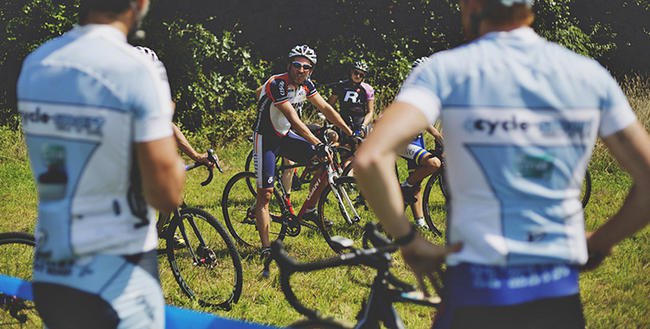Why You Might Need a Coach
Finding the right trainer for your cycling needs can be tough, but oh-so-worthwhile.
Finding the right trainer for your cycling needs can be tough, but oh-so-worthwhile. – By Molly Hurford

Know What You Want, and Why
Before you start the coach search, make a list of things you’re looking to improve, so you can find a coach who specialises in what you need. “Go for a coach that has a good track record in your specific type of cycling, and with athletes like you,” says Al Donahue, a Massachusetts-based coach with Cycle-Smart Cycling Solutions. There are many ways a coach can improve your cycling, including skill sessions, tactics, recovery techniques, correct implementation of workouts, and more, says Donahue. “The key is the athlete making changes from the practices that were resulting in their previous plateau.”
Consult a Coach to Find a Coach
If you’re not sure what you’re looking for, but you know you want your cycling to improve, sit down with a professional to decide if you even need structured help, says Molly Cameron, coach and owner of the Portland Bicycle Studio. “You should seek out a coach or mentor if you are looking to improve your skills, performance, results, or experience in sport,” she explains. A good trainer might advise that an online training plan is right for you and can save you some cash. He or she also might suggest an upcoming skills clinic, or recommend a good one-on-one strategy. But go into a consult with an open mind.
Don’t Commit Too Soon
“Do your research,” Cameron suggests. What may work for your friend may be terrible for you, and vice versa. You’re hiring a coach to do a job, so it’s reasonable to conduct a few interviews before committing – even online trainers will hop on the phone for a few minutes before you sign up. “There are far too many Cat. 2 coaches and amateur coaches out there that will take your money and provide a sub-par product,” Cameron adds. “Find a professional.”
Picking a Coach Online or In-Person
One of the toughest questions when choosing someone to help you train is whether that training should occur in person or online. For skills-based concerns, in-person coaching is almost mandatory. For a more straight-forward training plan, online programs may save you money, and it’s by far the easiest option if you travel a lot. Online coaching isn’t necessarily impersonal, either: Plenty of online coaches provide phone or video consults, if you don’t have a great local option. Again, you need to think about what you’re hoping to improve with coaching. “There are some fantastic online resources and web based training/coaching services but, in my experience and opinion, from the beginner to professional level, a personal relationship will provide more options and a more thorough coaching experience,” Cameron says. “A good coaching relationship will also provide emotional and mental support [during training], and that is something you cannot get from the Internet.”
RELATED: 5 Quick Recovery Tricks to Get You Back on the Bike
Communicate, Communicate, Communicate
Once you find a coach, you can’t just sit back and blindly follow directions—you have to help create them. Communication is key, as all three of the coaches we interviewed explain. “Communicate before you decide on a coach, at the beginning of a coaching relationship, during a coaching relationship, and well after it ends,” says Cameron. “Too often, I’ll see riders in a funk or unsure of what to do or what’s next, and the missing piece is communication between athlete and coach.”
A coach can’t fix something if he or she doesn’t know that a problem exists. “Report how the training is going with the most detail you can manage,” Donahue adds. “The good, the bad, and the ugly is all important.”
Be Honest
Not only do you need to communicate, but you also need to communicate honestly about how you’re feeling, how training is going, and even how you want a coach to communicate. Some coaches are natural cheerleaders, and you may love or hate that, while others are a bit more tacit and won’t be sending emoji-heavy emails. Let yours know what you need. “Athletes need to be honest with themselves and then honest with their coach,” says Donahue’s colleague Jacob Fetty. “A coach will help you figure out how best to pedal your bike, but will never push the pedals for you, so honest communication between coach and rider is paramount.”
Be Accountable
One of the best parts of having a coach is that there’s someone to keep you accountable – as long as you remember to treat coaching like a job. “Having someone to be accountable to can be a game changer,” Cameron says. “It is like having a boss: If you are not doing your job correctly, you will hear about it! A great coach will help an athlete create good habits, get rid of bad habits, and lay the foundation for a lifetime of success.” Of course, that only happens if you pay attention and actually listen to what your coach is saying. So stay focused.
When the Coach Says to Chill Out, Listen
A good coach doesn’t just put you through the paces—he or she also tells you when to recover. “Generally, when you help a person balance training into their already-hectic life, you see marked results,” Fetty says. “So often, I see people riding too much and too hard for the amount of training time they have available and they are just pounding themselves into the ground—not just riding-wise, but also work-wise, relationship-wise, and so on.” When one thing is out of balance, the whole picture suffers, says Fetty. “When you are able to help establish balance and harmony while instilling solid training habits, fitness and results skyrocket.”
READ MORE ON: Skills training programmes workouts

